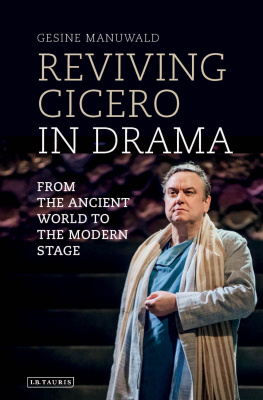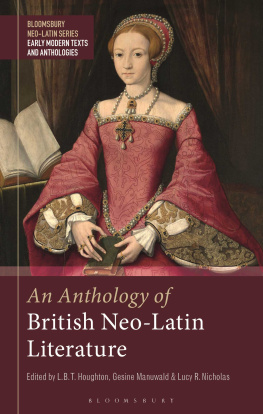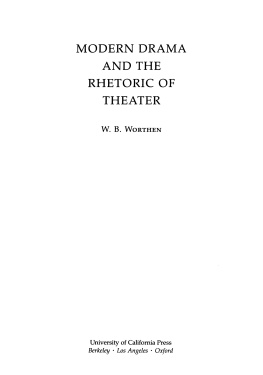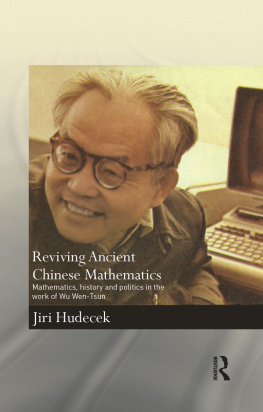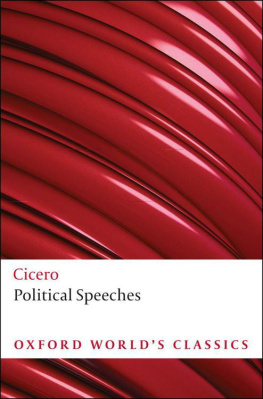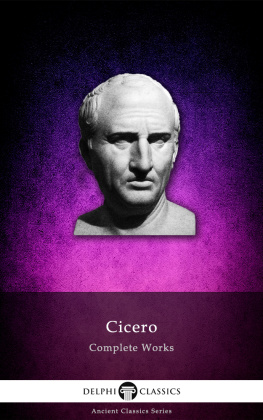Gesine Manuwald - Reviving Cicero in Drama: From the Ancient World to the Modern Stage
Here you can read online Gesine Manuwald - Reviving Cicero in Drama: From the Ancient World to the Modern Stage full text of the book (entire story) in english for free. Download pdf and epub, get meaning, cover and reviews about this ebook. year: 2018, publisher: Bloomsbury, genre: Non-fiction. Description of the work, (preface) as well as reviews are available. Best literature library LitArk.com created for fans of good reading and offers a wide selection of genres:
Romance novel
Science fiction
Adventure
Detective
Science
History
Home and family
Prose
Art
Politics
Computer
Non-fiction
Religion
Business
Children
Humor
Choose a favorite category and find really read worthwhile books. Enjoy immersion in the world of imagination, feel the emotions of the characters or learn something new for yourself, make an fascinating discovery.
- Book:Reviving Cicero in Drama: From the Ancient World to the Modern Stage
- Author:
- Publisher:Bloomsbury
- Genre:
- Year:2018
- Rating:5 / 5
- Favourites:Add to favourites
- Your mark:
- 100
- 1
- 2
- 3
- 4
- 5
Reviving Cicero in Drama: From the Ancient World to the Modern Stage: summary, description and annotation
We offer to read an annotation, description, summary or preface (depends on what the author of the book "Reviving Cicero in Drama: From the Ancient World to the Modern Stage" wrote himself). If you haven't found the necessary information about the book — write in the comments, we will try to find it.
Reviving Cicero in Drama: From the Ancient World to the Modern Stage — read online for free the complete book (whole text) full work
Below is the text of the book, divided by pages. System saving the place of the last page read, allows you to conveniently read the book "Reviving Cicero in Drama: From the Ancient World to the Modern Stage" online for free, without having to search again every time where you left off. Put a bookmark, and you can go to the page where you finished reading at any time.
Font size:
Interval:
Bookmark:

Gesine Manuwald is Professor of Latin at University College London. She is the author of Roman Drama: A Reader (2010), Roman Republican Theatre (2011), Cicero (for the Understanding Classics series, I.B.Tauris, 2015), and a number of other works.

Published in 2018 by
I.B.Tauris & Co. Ltd
London New York
www.ibtauris.com
Copyright 2018 Gesine Manuwald
The right of Gesine Manuwald to be identified as the author of this work has been asserted by the author in accordance with the Copyright, Designs and Patents Act 1988.
All rights reserved. Except for brief quotations in a review, this book, or any part thereof, may not be reproduced, stored in or introduced into a retrieval system, or transmitted, in any form or by any means, electronic, mechanical, photocopying, recording or otherwise, without the prior written permission of the publisher.
Every attempt has been made to gain permission for the use of the images in this book. Any omissions will be rectified in future editions.
References to websites were correct at the time of writing.
Library of Classical Studies 36
ISBN: 978 1 78831 296 7
eISBN: 978 1 78672 558 5
ePDF: 978 1 78673 558 4
A full CIP record for this book is available from the British Library
A full CIP record is available from the Library of Congress
Library of Congress Catalog Card Number: available
Contents
PREFACE AND
ACKNOWLEDGEMENTS
This study aims to make a contribution to exploring the rich and varied reception of Cicero by highlighting a specific aspect: Cicero presented as a figure on the theatre stage, when the historical Cicero is brought back to life as it were. The focus, then, is not on an analysis of Cicero's writings, on their paradigmatic quality in rhetorical or stylistic terms or on more or less critical assessments of his personality; instead, presenting Cicero as a dramatic character allows audiences to experience directly his complex personality including strengths and weaknesses. On the theatre stage Cicero does not speak in classical Latin, rather in humanist Latin or one of the European vernaculars, but there is not also a transposition into completely different media and frameworks as in the case of recreations in operas or films. Since playwrights decide individually which features to emphasize, studying the reception of Cicero from the perspective of drama not only enables insights into the assessment of the life and activities of the historical Cicero over time, but also offers interesting glimpses into European literary and political history. For the reception of Cicero in stage drama can look back on a long history stretching over many centuries; at the same time, the continued interest in dramatizing Cicero is obvious from the fact that Robert Harris contemporary novels on Cicero have recently been adapted by Mike Poulton for stage production by the Royal Shakespeare Company.
Completing this project would not have been possible without the generous and much appreciated help of numerous individuals and institutions.
Several libraries, including Bayerische Staatsbibliothek Mnchen, Biblioteca Maldura, Bibliothque cantonale et universitaire Fribourg and Biblioteca Palatina di Parma, sent digital reproductions of texts not yet available online. Staff at Archiv der Deutschen Provinz der Jesuiten, Bayerische Staatsbibliothek Mnchen, Biblioteca La Magna Capitana di Foggia, Bibliothque municipale de Lyon, Hessisches Staatsarchiv Darmstadt, Franziskanerprovinz Austria, Stadtbibliothek Ingolstadt, University of Kansas Libraries and Kulturamt Krems provided helpful answers to questions of detail.
Elsa Strietman assisted with the translation of the Dutch texts and offered expert information on their cultural background. Sophie Fuller checked translations of several of the Italian plays, and Martin Gagnone did the same for the pieces in Spanish. Mathilde Skoie contributed stimulating insights and bibliographical references concerning the reception of Catiline.
From the start family, friends and colleagues in London have shown great interest in this project and have provided encouragement, scholarly interaction, fruitful discussions and technical assistance: this has been an invaluable source of support throughout.
INTRODUCTION: CREATION
OF THE CHARACTER CICERO
Marcus Tullius Cicero (10643 BCE ) stands out among the illustrious personages of the ancient world (Greek and Roman): His written output has not only provoked a rich literary response, when later writers took up and engaged with themes, motifs and stylistic features of his works (as they did in the case of other classical authors in similar ways), but he has also been recognized as an individual personality and an historical figure with a turbulent life, which has led to another set of reactions to Cicero's biography and writings. One reason for this situation is that there is more (circumstantial) information on the figure of Cicero, his works and his life than there is for other ancient authors, because a large amount of his writings, including personal letters, survives and because he was active as a politician and therefore is referred to in ancient historiographical sources.
As a result, in addition to a number of rhetorical, political and philosophical works inspired by Cicero's treatises and interacting with ideas presented there as well as speeches using rhetorical features frequent in Cicero's orations, there is a flourishing branch of the reception of Cicero devoted to Cicero the man: Cicero appears as a character in a significant number of novels, dramas as well as (more recently) films and audio dramas and even paintings, to name but a few genres of literature and art. These pieces tend to focus on exciting episodes of Cicero's life rather than providing an overview of his entire biography. The framework for the selected sequences of events and information about protagonists with an historical basis have typically been taken from ancient sources; the views and characteristics attributed to the figure Cicero have generally been created with his writings and reports in ancient historiographers used as starting points (sometimes filtered by intermediate sources). Beyond what has been developed from the historical evidence, there might be unhistorical, fictional characters and/or additional subplots; events or figures mentioned in passing in the historical sources may have been elaborated, with such characters given biographies of their own. In some scenes historical figures might be presented in situations for which no historical evidence exists. As a result of such additions and modifications Cicero may be shown in new contexts. Then the focus is no longer on an accurate presentation of Cicero's personality (matching what transpires from the written record), but rather on exploiting this figure and the associated events as a vehicle to convey messages relevant for the time of composition.
In such works Cicero is usually characterized as a well-known public figure and a famous orator, to whom positive or negative features can be ascribed, and he is often directly or indirectly interpreted as an exemplum. In this respect the poem by the German poet Christian Frchtegott Gellert (17151769) Der gehoffte Ruhm (The hoped-for fame) is a telling example: the piece presents the historical Cicero's account of his return to Italy after his quaestorship in the province of Sicily in 75 BCE (Cic. Planc. 6466; Plut. Cic. 6) in a novel poetic form and develops a moral from Cicero's experiences:
Next pageFont size:
Interval:
Bookmark:
Similar books «Reviving Cicero in Drama: From the Ancient World to the Modern Stage»
Look at similar books to Reviving Cicero in Drama: From the Ancient World to the Modern Stage. We have selected literature similar in name and meaning in the hope of providing readers with more options to find new, interesting, not yet read works.
Discussion, reviews of the book Reviving Cicero in Drama: From the Ancient World to the Modern Stage and just readers' own opinions. Leave your comments, write what you think about the work, its meaning or the main characters. Specify what exactly you liked and what you didn't like, and why you think so.

